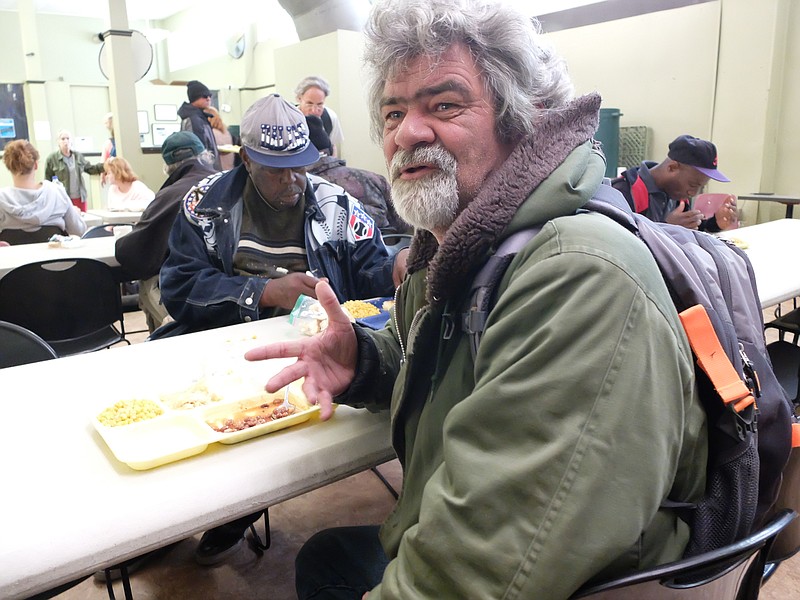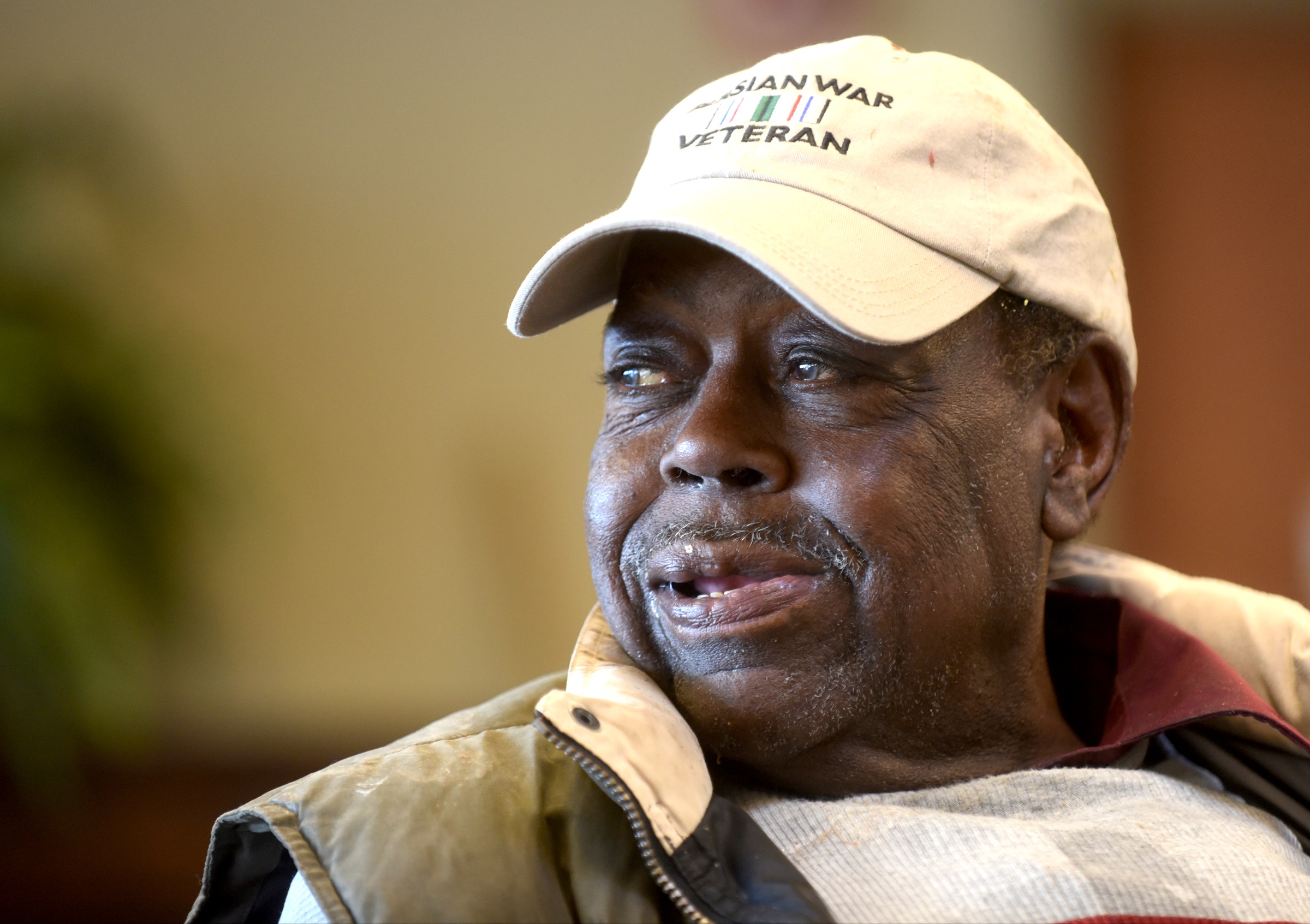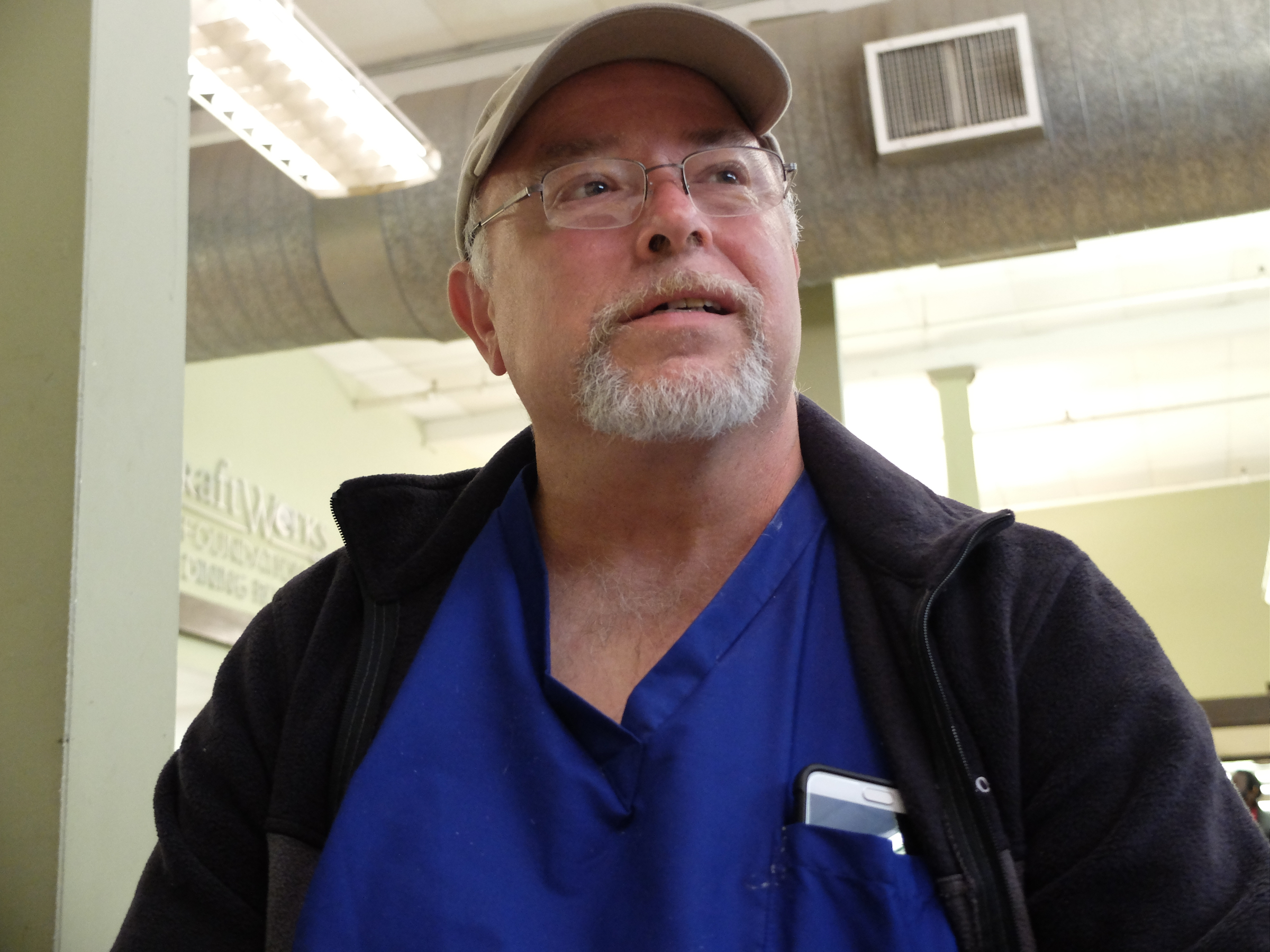The reality is that it's a tragedy that any veteran would ever experience homelessness.
While Chattanooga is making progress toward ending veteran homelessness by the end of the year, some local veterans say they still feel forgotten.
One 65-year-old Army veteran says the government has failed to fulfill its promises to him since his honorable discharge, and he suspects the city's promise to end veteran homelessness is no different.
"In Vietnam, all the soldiers did what the government told them to do, which was totally wrong to begin with, and they still haven't got repaid for the ---- that they put up with," said Walter T. Pratt, while eating recently at the Chattanooga Community Kitchen.
By the numbers
80: Homeless veterans listed by name with the city in January 201538: Homeless veterans remain to be housed140: Homeless veterans who have been housed since January 201510: The city houses an average of 10 veterans a month33 percent: The National Alliance to End Homelessness reports that the count for homeless seniors is expected to increase 33 percent from 2010 to 2020.Source: City of Chattanooga and The National Alliance to End Homelessness
Assistance
Veterans seeking housing assistance may call:Mission Accomplished: Stable Housing at 1-877-567-6051 orThe city’s homeless program coordinator at 643-7301.
Pratt is among several homeless veterans the city vows to house by the end of the year as part of a nationwide initiative called Zero: 2016.
And, despite Pratt's skepticism, city officials say they are on target to reach their goal.
Chattanooga is housing an average of 10 veterans a month, with 38 still in need of housing, said Heather Hoffman, the city's homeless program coordinator. The active list started in January 2015 with 80 veterans and, at one point, included more than 100 people. Since then the city has housed 140 veterans, Hoffman said.
The city will be able to declare that it has ended veteran homelessness when it shows that it can house within 30 days as many veterans who become homeless within that same time period. As part of the local initiative, Mayor Andy Berke organized a task force that meets weekly to discuss cases.
After the city declares victory over veteran homelessness, officials say, they plan to use the same model on all homeless populations, including chronic homeless, the elderly and families.
Chattanooga isn't striving against veteran homelessness alone.
President Barack Obama's 2016 budget includes nearly $5.5 billion in targeted homelessness assistance, according to the U.S. Interagency Council on Homelessness. The U.S. Department of Veterans Affairs' website lists Virginia, Houston and New Orleans as examples of cities and states that have ended veteran homelessness. Across the country, veteran homelessness has fallen 33 percent since 2010, when the federal government started its nationwide plan to combat the problem, according to the VA. It is estimated that there are nearly 50,000 veterans nationwide, according to the Zero: 2016 initiative.
Veterans eating lunch at the Community Kitchen on Tuesday had mixed views of the program.
U.S. Army veteran Charles Cloud wants housing and said he's had people from the city contact him, but he still thinks "it's a bunch of nonsense ," he said.
"I've been promised this and that and nothing happens. The Army is 'hurry up and wait' always," said Cloud, who's been homeless for years.
Former U.S. Marine Kelly Kidd sat across from him.
"I'm trying to think positive because I've got a medical condition and a fiancée," he said.
Kidd said he talked to an advocate last Friday who told him it would be at least a month before he hears anything again concerning housing.
Pratt, who has been homeless for more than a decade, sleeps on the streets near churches, on loading docks or under bridges near interstates. He's angry about what he says are failed promises and is discouraged about finding housing.
Hoffman said it's challenging to help homeless people because it's hard keeping in contact with them when they have no stable address or phone number.
Some veterans also struggle with post-traumatic stress disorder and can't stand being around lots of people. However, veterans have a number of resources available to them that may not be available to others, said Jens Christensen, executive director of the Chattanooga Community Kitchen and a part of the mayor's task force to end veteran homelessness.
"The reality is that it's a tragedy that any veteran would ever experience homelessness," Christensen said. "Of course, it's a tragedy that any human would ever experience homelessness."
Pratt worked with Mission Accomplished: Stable Housing (M.A.S.H.), a program launched by Volunteer Behavior Health Care System to help veterans. He said he and his caseworker met only once and that meeting was a waste of time. Pratt's caseworker said he could not comment on Pratt's case because of privacy concerns.
Pratt said the caseworker gave him a list of available apartments, but he has no transportation to get to them, nor can he afford the $700 monthly rent that many of the property owners require.
"This is worth nothing to me," Pratt said while unfolding paper listings of veteran service providers and addresses for available housing.
Connie Farmer, director of the M.A.S.H. program, also said she couldn't respond to Pratt's specific concerns because of privacy concerns, but in general, she said, the program's goal is to keep in touch with clients, although many don't have permanent addresses, nor do they always have phones. Caseworkers give veterans a list of available housing, names and addresses so veterans can independently work toward finding housing, even if they lose contact with their caseworkers. Veterans also are given their caseworker's phone number, she said.
The program typically can house veterans within 26 days, she said.
M.A.S.H. representatives are part of the committee that meets weekly with Mayor Andy Berke's task force on ending veteran homelessness to discuss homeless veterans by name, Farmer said.
Pratt said he's called "all kinds of names and numbers and nobody replies to anything."
"I have a guy that's supposed to see me who never shows up," he said.
The underlying problem with veteran homelessness and all homelessness is that there isn't enough affordable housing available, said Megan Hustings, director of the National Coalition for the Homeless.
"Housing costs are insanely high for everyone, especially people on fixed incomes and those trying to get by on Social Security," she said.
Farmer expressed the same sentiment in a Supportive Services for Veteran Families Community Plan summary.
"Lack of affordable housing is the primary challenge [to housing veterans] in this area," she wrote. "Veterans are often not able to find suitable affordable housing even after vouchers are obtained. There is also a very limited number of vouchers for people who are on the sex offender registry or are otherwise ineligible for other vouchers and limited choices that meet sex offender placement restrictions [distance from schools, day cares, etc.]."
Creating more affordable housing is key to ending homelessness for all people, Hustings said.
Between 1979 and 1983, the federal government cut the budget for public housing from $16 billion to $2 billion. That's more than a 75 percent cut in four years, and funding levels have never returned. So now public housing sites in Chattanooga and across the nation are deteriorating because housing agencies don't have funds to keep them up, Hustings said.
Clarence Royal has been homeless off and on for more than a year. The 63-year-old former U.S. Marine doesn't have a mentor and said he doesn't meet with anyone regularly about finding housing. He's content living in hotels. But he says he appreciates the national and city government focusing on housing veterans. And he believes the mayor will reach his goal.
"You've got to believe," Royal said.
Contact staff writer Yolanda Putman at yputman@timesfreepress.com or 757-6431.


